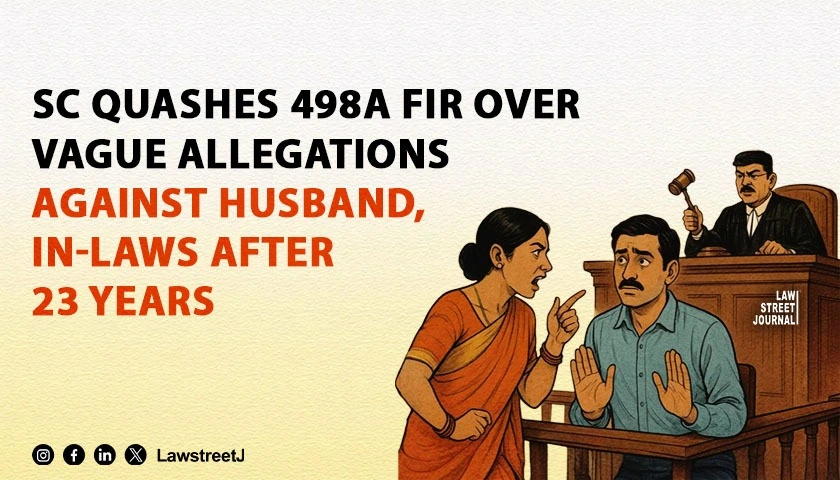New Delhi: The Supreme Court of India has delivered a significant judgment quashing an FIR and chargesheet filed against a husband and his family members under Section 498A of the Indian Penal Code, emphasizing that generic allegations lacking specific details cannot sustain a criminal prosecution.
A bench comprising Justices B.V. Nagarathna and Satish Chandra Sharma heard Criminal Appeal Nos. 2894-2895 of 2025 arising out of SLP (Crl.) Nos. 9709/2024 and 17951/2024, filed by Ghanshyam Soni against the State (Govt. of NCT of Delhi) and another respondent.
The case originated from a complaint filed by the wife on July 3, 2002, which led to FIR No. 1098/2002 dated December 19, 2002, registered at PS Malviya Nagar against the appellant husband and his in-laws for offences under Sections 498A, 406, and 34 of the IPC.
The court noted the complainant’s allegations of dowry demands, physical and mental cruelty, and threats made by the husband and his family members between 1998–1999. However, the court observed:
“The allegations made by the complainant are generic and rather ambiguous. The allegations against the family members, who have been unfortunately roped in, are that they used to instigate the appellant husband to harass the complainant wife and taunted her for not bringing enough dowry; however, there is no specific incident of harassment or any evidence to that effect.”
Highlighting the lack of concrete evidence, the court observed that the allegations were merely accusatory and contentious, failing to present a clear or coherent account of events. Given that the evidence on record was inconsistent with the claims, the court found the complainant’s version implausible and unreliable.
The court emphasized the importance of protecting distant relatives from false implication, citing K. Subba Rao v. State of Telangana:
“The courts should be careful in proceeding against distant relatives in crimes pertaining to matrimonial disputes and dowry deaths. The relatives of the husband should not be roped in on the basis of omnibus allegations unless specific instances of their involvement in the crime are made out.”
The court also addressed evidentiary requirements, noting:
“The complainant has admittedly failed to produce any medical records, injury reports, X-ray reports, or any witnesses to substantiate her allegations.”
Regarding the limitation period, the court clarified that the complaint dated July 3, 2002, was filed within the three-year limitation prescribed under Section 468 CrPC, holding that the relevant date for computing limitation is the date of filing the complaint, not the date on which the magistrate takes cognizance.
However, despite finding no limitation bar, the court exercised its powers under Article 142 of the Constitution to quash the proceedings, stating:
“Upon consideration of the relevant circumstances and that the alleged incidents pertain to the year 1999, and since then the parties have moved on with their respective lives, it would be unjust and unfair if the appellants are forced to go through the tribulations of a trial.”
The court also expressed concern over the misuse of legal provisions, observing:
“It is rather unfortunate that the complainant, being an officer of the State, has initiated criminal machinery in such a manner, where the aged parents-in-law, five sisters, and one tailor have been arrayed as accused.”
In conclusion, the court allowed both criminal appeals and quashed FIR No. 1098/2002 dated December 19, 2002, registered with PS Malviya Nagar, and the chargesheet dated July 27, 2004.
Case Title: Ghanshyam Soni vs. State (Govt. of NCT of Delhi) & Anr.











